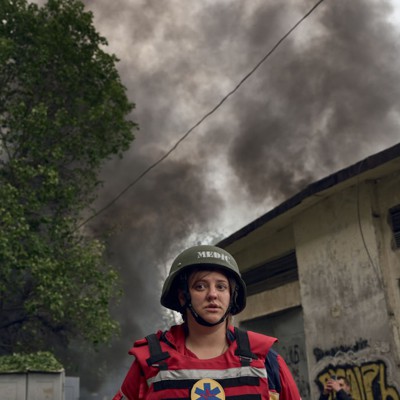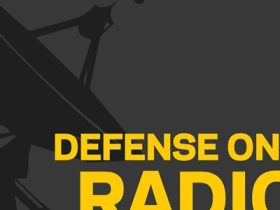As Secretary of State Anthony Blinken played guitar in Kyiv, part of a trip to announce another round of arms support, several Ukrainian government officials were meeting with lawmakers in Washington to pressure the White House to remove restrictions on how Ukraine uses U.S. weapons—particularly long-range ATACMS missiles. They also want more training for F-16 pilots in the United States.
Despite the passage of the recent supplemental security package, which rushed desperately-needed munitions to the front lines, Ukrainians anticipate a brutal few months ahead. Russia is rapidly changing tactics and going after bigger targets with less restraint.
“The Russians have changed their strategy. Before, they tried to occupy [cities and towns.] Now they’re literally wiping out cities,” Oleksandra Ustinova, a Ukrainian member of parliament, told reporters gathered at the German Marshall Fund on Tuesday.
Russia is now using more FAB-1500 glide bombs—1.5-ton bombs that deploy from SU aircraft 50 to 60 kilometers away from their target. “They destroy everything,” Ustinova said, pointing to the devastation of Mariupol as an illustration of what’s now happening in Kharkiv and could happen to other cities across Ukraine. And Ukraine’s success in intercepting missiles is declining.
In the months ahead, Ukrainians also expect Russia to broaden the scope of its invasion to include more economic targets.
“The goal is to hit the electricity lines. If there will be less electricity, there will be less production and industries working. So less taxes, meaning less GDP. Less salaries, so we can’t afford to pay the military,” said David Arahamiya, also a member of parliament.
To defend against those attacks, the officials said, Ukraine needs three things that they aren’t getting: Patriots, F-16 pilots, and a lift in restrictions that would allow them to use U.S.-supplied weapons to hit targets in Russia.
“We have three Patriot systems right now. The fourth is coming, None of them from the United States,” Ustinova said.
The United States has deep concerns about maintaining missile supplies for Patriot batteries, especially given rapidly increasing Israeli requests for more missiles. “There are going to be orders piling up for Patriot missile batteries out the door and around the corner,” Jake Sullivan, the White House national security advisor, told Defense One in April.
Ukraine also needs more training for F-16 pilots, who can shoot down Russian aircraft and glide bombs, officials said.
The United States expects to have trained about one squadron of Ukrainian F-16 pilots by the end of the summer, a U.S. official with direct knowledge of U.S. training efforts told Defense One. But the official said a shortage of Ukrainian pilots that can speak sufficient English has been a limiting factor.
However, the Ukrainian officials pushed back on that premise, saying they have more than enough pilots that have passed English exams. But they were told the main facility for training foreign pilots, Morris Air National Guard Base in Tucson, Arizona, didn’t have enough spots available.
“They were taken by other countries or by the U.S. military,” said Ustinova, who pointed out that the American pilots could conceivably train elsewhere.
But perhaps the most important thing the United States could do to help Ukraine better defend itself against the coming Russian onslaught is to lift restrictions it hass placed on Ukraine for using U.S.-supplied weapons to strike inside Russian territory.
The White House has long insisted that military aid the U.S. provides to Ukraine should not be used to strike targets across the Russian border. The Ukrainians argue that Russia has adapted its vulnerable supply lines around that reality.
“The main problem is the White House policy to limit our capabilities so we cannot use the weapons that we have to be in our possession, because [some key supply targets] are very, very close to the Russian border,” Arahamiya said.
That allows Russia to attack key cities with impunity, they said.
“We have a huge possibility to lose large cities and the region because [the Russians] know about this restriction, and they’re using it in their favor,” Ustinova said.
She pointed out that other countries, like Israel, currently face no similar restrictions.
Read the full article here




:quality(70)/cloudfront-us-east-1.images.arcpublishing.com/archetype/YHDGILSCVVG3LEYJGLOZSPIEEQ.JPG)
:quality(70)/cloudfront-us-east-1.images.arcpublishing.com/archetype/E43XN2JDZZAMXOSMQBU5SPU53E.jpg)

Leave a Reply